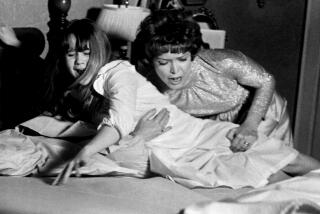Race, politics and murder in ‘80s Houston
On more than one occasion, I have met a graying intellectual, attorney or businessperson only to later learn they were once members of the Student Nonviolent Coordinating Committee or the Black Panther Party, Students for a Democratic Society or the Weather Underground. Such encounters leave me wondering -- how does a person evolve from a young firebrand who marched, rioted (or worse) to relative domesticity, and what did they lose or gain along the way?
Attica Locke had to look no further than her parents for the question to arise, but the answer came from her imagination and is chronicled in her debut thriller, “Black Water Rising.” Set in oil-obsessed Houston in 1981, the novel follows Jay Porter, a 30-year-old attorney whose small practice (personal injury, slip-and-falls) can’t cover the bills or allow him to properly provide for his pregnant wife, Bernie. Even the birthday surprise he conspires with Bernie’s sister to arrange -- a boat ride along Buffalo Bayou, helmed by a longshoreman who’s a relative of a client -- is a downscale affair featuring some take-out barbecue, a few balloons and a store-bought chocolate cake.
It’s clear that Bernie and her family are all Jay has. His other connections -- an estranged sister and mother, “comrades, cats from way, way back” -- have broken off in the aftermath of his college arrest, trial and by-a-hair’s-breadth acquittal for conspiracy to murder a fellow “activist” who was actually an undercover federal informant. Jay’s harrowing experience at 21 killed his spirit, the passion he once felt for “the cause” of black activism reduced to little more than picking sides. And the people on the side Jay has picked favor hard work over protest, business suits over dashikis, and making money playing by the new rules of the Reagan era. And while Jay notes wryly that money is the “new Jim Crow,” he wants in on the game in the worst way.
Jay’s middle-class rule book gets kicked to the curb when he and Bernie hear a cry for help and gunshots coming from somewhere across the bayou. At his wife’s insistence, Jay dives into the water, and drags out someone who has jumped -- or was pushed. The victim turns out to be a white woman. She is unharmed but her mute presence is an implicit danger to Jay, who, knowing “firsthand the long, creative arm of Southern law enforcement,” drops her like a bad habit at the nearest police station.
Jay’s need to focus on his most promising case, a hooker suing the Houston port commissioner for an injury sustained during a “date,” is thwarted when he learns a white man was killed on the bayou the night he saved the mystery woman. Complicating matters further, Bernie’s father, the Rev. Al Boykins, asks Jay to represent a young man beaten for his involvement in the black longshoremen’s union, which is about to strike for pay and promotions enjoyed by the white bargaining unit. Boykins, egged on by Jay’s college nemesis Lloyd “Kwame” Mackalvy, wants Jay to intercede on the black longshoremen’s behalf with Cynthia Maddox, Houston’s first female mayor who has remade herself into a helmet-headed Republican, erasing her student involvement with the SDS -- and her previous love affair and possible betrayal of Jay.
Locke deftly moves between past and present action to portray the young lovers as well as re-create the tension between the black and white radical groups on the University of Houston campus. And while the flashbacks -- arguments with Kwame and other students over strategy, the pivotal involvement of the Black Panthers’ Stokely Carmichael, a campus riot -- generate some heat of their own, these forays into Jay’s past also serve to illuminate his persistent paranoia and his reluctance to talk with police about the bayou murder while deepening the reader’s understanding of the crossroads at which he and Cynthia find themselves.
Before the reader cries “too much information,” things begin to happen, fast. The longshoreman who piloted Jay and Bernie’s bayou cruise is found dead. Was his death related to the bayou murder or the strike? And who’s following Jay in a black Ford LTD, and why? Then Jay’s house is ransacked and one of his guns is stolen -- a .22 pistol, the same caliber weapon that killed the man on the bayou. Is Jay about to be framed by the police the same way they tried to get him on the conspiracy rap a decade earlier? Or does someone else want him and Bernie out of the way?
“Black Water Rising” was inspired by an actual incident involving young Attica and her father, a former radical turned attorney. But what she makes of it puts her in the company of master thriller writers such as Dennis Lehane or Scott Turow. “Black Water Rising” is a near-perfect balance of trenchant social commentary, rich characterizations and an action-oriented plot that, after it kicks in, moves rapidly toward some explosive revelations well-suited to the growth-crazed Houston that Locke so accurately evokes. Maybe it’s her screenwriting chops (Locke has written scripts for several studios and is currently working on an HBO miniseries) on display, but I couldn’t help seeing Locke’s taut scenes of campus dissent, union showdowns and Houston politics spooling out across a screen, keeping me awake long past bedtime. But it’s Jay Porter, a bruised and broken former radical reaching for redemption, who makes the most lasting impression in “Black Water Rising” and marks Attica Locke as a writer wise beyond her years.
More to Read
Sign up for our Book Club newsletter
Get the latest news, events and more from the Los Angeles Times Book Club, and help us get L.A. reading and talking.
You may occasionally receive promotional content from the Los Angeles Times.






